般疑问句以及肯定句否定句练习题
- 格式:doc
- 大小:22.50 KB
- 文档页数:2
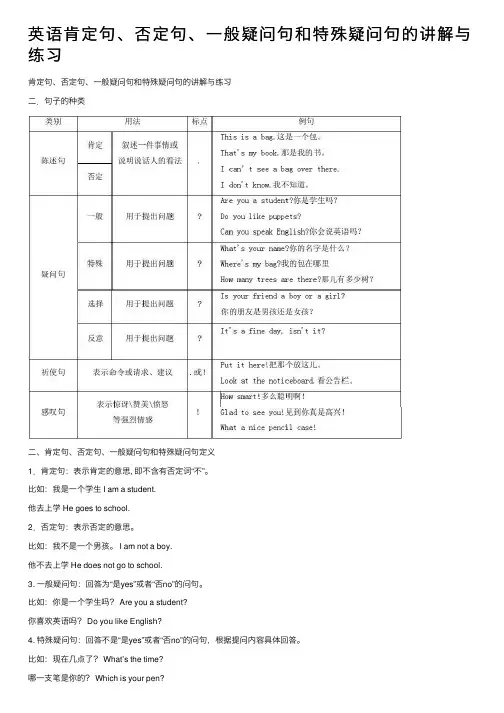
英语肯定句、否定句、⼀般疑问句和特殊疑问句的讲解与练习肯定句、否定句、⼀般疑问句和特殊疑问句的讲解与练习⼆.句⼦的种类⼆、肯定句、否定句、⼀般疑问句和特殊疑问句定义1.肯定句:表⽰肯定的意思, 即不含有否定词“不”。
⽐如:我是⼀个学⽣ I am a student.他去上学 He goes to school.2.否定句:表⽰否定的意思。
⽐如:我不是⼀个男孩。
I am not a boy.他不去上学 He does not go to school.3. ⼀般疑问句:回答为“是yes”或者“否no”的问句。
⽐如:你是⼀个学⽣吗? Are you a student?你喜欢英语吗? Do you like English?4. 特殊疑问句:回答不是“是yes”或者“否no”的问句,根据提问内容具体回答。
⽐如:现在⼏点了? What’s the time?哪⼀⽀笔是你的? Which is your pen?三、肯定句、否定句、⼀般疑问句和特殊疑问句的相互转换肯定句变否定句:在am, is, are 后⾯加上not,其余按顺序照抄。
肯定句变⼀般疑问句:把am, is, are 提前放到句⾸并⼤写Am, Is, Are,其余照抄。
肯定句变特殊疑问句(就划线部分提问):分3步骤第⼀步:先变⼀般疑问句。
第⼆步:找合适的特殊疑问词代替划线部分。
第三步:特殊疑问词提前放到句⾸,并⼤写,其余按顺序照抄,省略划线部分。
注意:1.如:Liming 's not here today. Who's not here today? 今天谁没来?2.划线部分不能在特殊疑问句中出现。
1.肯定句、否定句和⼀般疑问句的互换肯定句:否定句:⼀般疑问句:肯定回答:Yes, it is.否定回答:No, it isn’t.2.就划线部分提问(变特殊疑问句)This is a book.第⼀步:变⼀般疑问句 Is this a book?第⼆步:找合适的特殊疑问词 Is this what ?What is this?do not或者does not,其余按顺序照抄动词⽤原形。
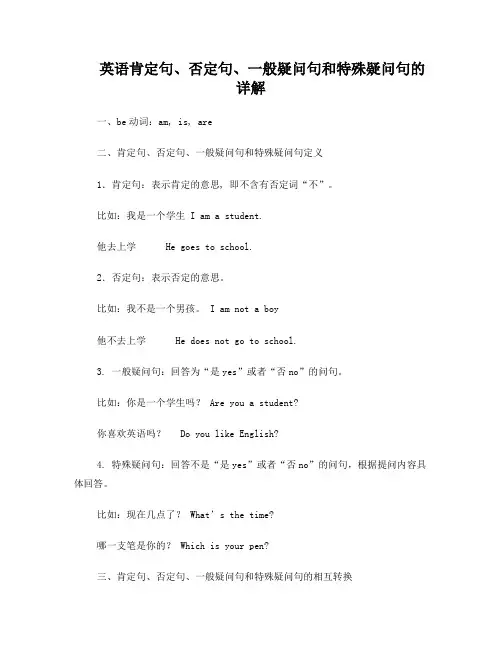
英语肯定句、否定句、一般疑问句和特殊疑问句的详解一、be动词:am, is, are二、肯定句、否定句、一般疑问句和特殊疑问句定义1.肯定句:表示肯定的意思, 即不含有否定词“不”。
比如:我是一个学生 I am a student.他去上学 He goes to school.2.否定句:表示否定的意思。
比如:我不是一个男孩。
I am not a boy他不去上学 He does not go to school.3. 一般疑问句:回答为“是yes”或者“否no”的问句。
比如:你是一个学生吗? Are you a student?你喜欢英语吗? Do you like English?4. 特殊疑问句:回答不是“是yes”或者“否no”的问句,根据提问内容具体回答。
比如:现在几点了?What’s the time?哪一支笔是你的? Which is your pen?三、肯定句、否定句、一般疑问句和特殊疑问句的相互转换有am, is, are的句子,肯定句变否定句:在am, is, are后面加上not,其余按顺序照抄。
肯定句变一般疑问句:把am, is, are提前放到句首并大写Am, Is, Are,其余照抄。
肯定句变特殊疑问句(就划线部分提问):分3步骤第一步:先变一般疑问句第二步:找合适的特殊疑问词代替划线部分第三步:特殊疑问词提前放到句首,并大写,其余按顺序照抄,省略划线部分。
注意:1.一定先变一般疑问句。
但是,如果问的是主语或主语的定语时,语序不变,为"特殊疑问词(+主语)+陈述句"。
如:Li ming 's not here today. Who's not here today? 今天谁没来?2.划线部分不能在特殊疑问句中出现。
when 什么时间(问时间)what date 什么日期问具体日期who 谁(问人)what place什么地点问具体地址whose 谁的问主人how …怎么样问情况where 在哪里问地点how old 多大问年龄which 哪一个问选择how many 多少问数量例如:1.肯定句、否定句和一般疑问句的互换肯定句:This is a book.否定句:This is not a book.一般疑问句:Is this a book?肯定回答:Yes, it is.否定回答:No, it isn’t.2.就划线部分提问(变特殊疑问句)This is a book.第一步:变一般疑问句 Is this a book?第二步:找合适的特殊疑问词 Is this what ?第三步:特殊疑问词提前放到句首,并大写,其余按顺序照抄,省略划线部分。
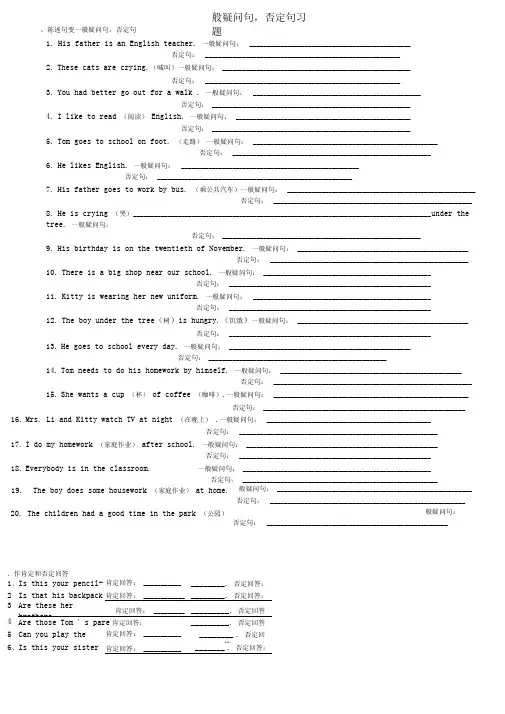
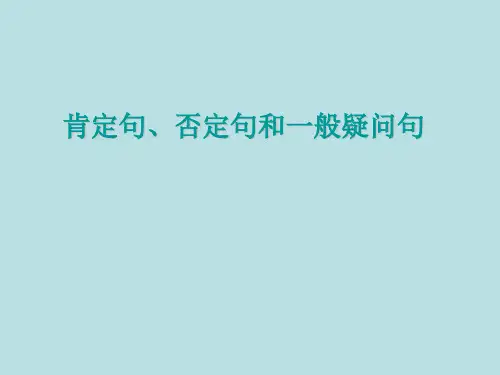
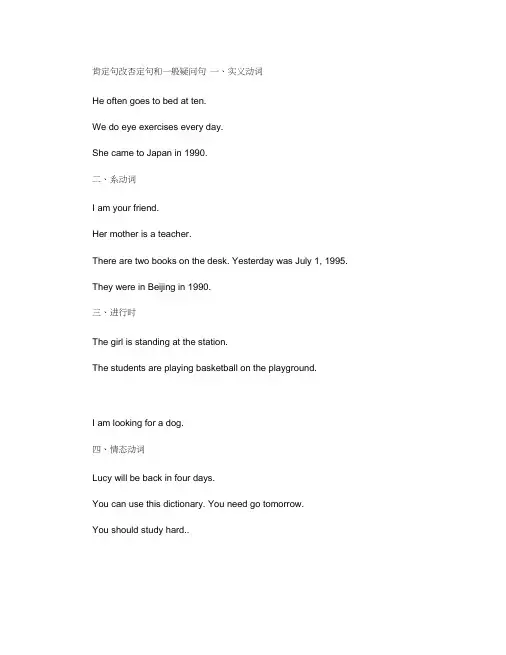
肯定句改否定句和一般疑问句一、实义动词He often goes to bed at ten.We do eye exercises every day.She came to Japan in 1990.二、系动词I am your friend.Her mother is a teacher.There are two books on the desk. Yesterday was July 1, 1995. They were in Beijing in 1990.三、进行时The girl is standing at the station.The students are playing basketball on the playground.I am looking for a dog.四、情态动词Lucy will be back in four days.You can use this dictionary. You need go tomorrow.You should study hard..将下列陈述句变为否定句和一般疑问句1.He found his pen under his desk.2.We must go to the meeting right now.3.I wrote him a letter last week.4. My sister sings beautifully.5. Mary missed the bus.6. This bus will take you right to the city.7. They are doing questions and answers with the teachers.8. My father has his lunch at 11:30 everyday.9. There is a policeman at the corner of the road..10. Wang made some model ships for the boys.11.I saw somebody in the room just now.12. There is some wonderful news in todays paper.13. Xiao Li dropped the letter into the letter box.14. They are playing on the playground.15. Tom often tells them stories in French.16. After class some students play balls.17. Mary is reading newspaper now.18.I telephoned you yesterday.19.You have to go now.20.I have a house in the country.21. We did our homework together.22. They study for examination.23. We are talking about the film.24.I can go to the zoo today. 25.The first class begins at eight o ' clock.26.It takes you three hours to go to Paris by air.27.I reviewed my lessons yesterday.28.I ' ll go home by bus.29.He forgot to post the letter this morning.30.This room is going to be painted next week.肯定句变否定句和一般疑问句类型答案一、实义动词He often goes to bed at ten.f He does not ofte n go to bed at ten.f Does he ofte n go to bed ate n?We do eye exercises every day. T We don' t do eye exercises every day. f Do you do eye exercises every day? She came to Japan in 1990.t She did not come to Japan in 1990. t Did she come to Japan in 1990?二、系动词I am your friend.t I am not your friend.t Are you my friend?Her mother is a teacher.t Her mother is not a teachert Is her mother a teacher?There are two books on the desk.t There are not two books on the desk t Are there two books on the desk? Yesterday was July 1, 1995.t Yesterday was not July 1, 195.t Was yesterday July 1, 1995?They were in Beijing in 1990.f They were not in Beiji ng in 1990—Were they in Beiji ng in 1990?三、进行时The girl is standing at the station.f The girl is not standing at the station.f Is the girl standing at the station?The students are playing basketball on the playground.f The students are not playing basketball on the playground.f Are the students playing basketball on the playground?I am looking for a dog.f I am not looking for a dog.f Are you looking for a dog?He was writing letters at this time last night.f He was not writing letters at this time last night.f Was he writing letters at this time last night? We were having a meeting this time yesterday.f We were not having a meeting this time yesterday.f Were you having ameeting this time yesterday?四、情态动词Lucy will be back in four days.f Lucy will not be back in four days.f Will Lucy be back in four days?You can use this dictionary.f You can not use this dictionary.f Can I use this dictionary?You need go tomorrow.f You need not go tomorrow.f Need I go tomorrow?You should study hard.f You should not study hard..f should I study hard?将下列陈述句变为否定句和一般疑问句。
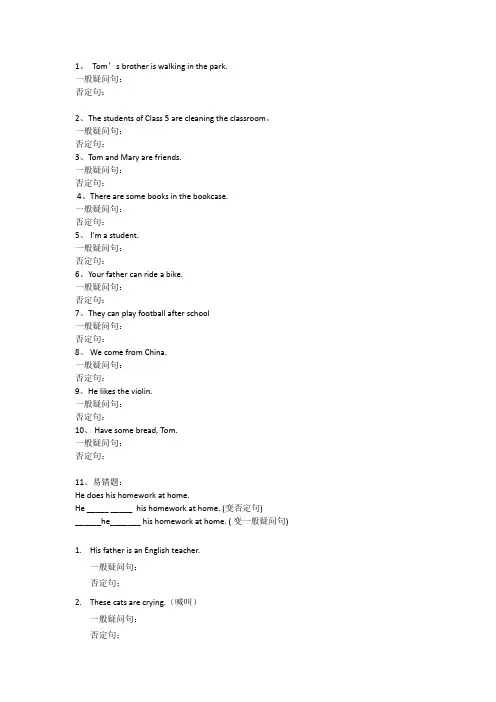

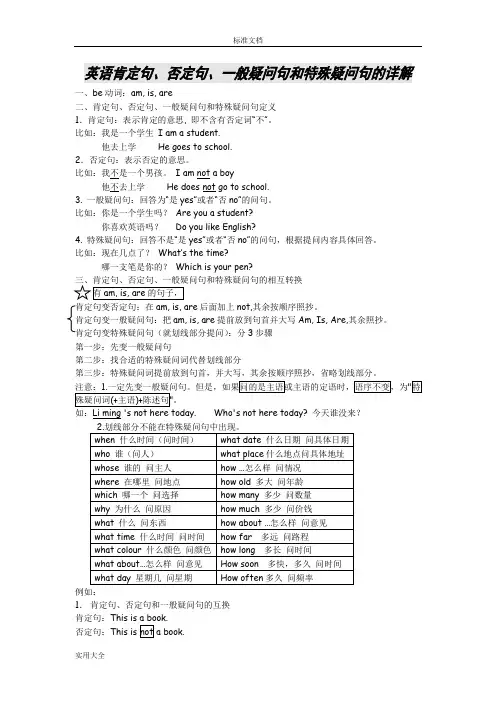
英语肯定句、否定句、一般疑问句和特殊疑问句的详解一、be动词:am, is, are二、肯定句、否定句、一般疑问句和特殊疑问句定义1.肯定句:表示肯定的意思, 即不含有否定词“不”。
比如:我是一个学生I am a student.他去上学He goes to school.2.否定句:表示否定的意思。
比如:我不是一个男孩。
I am not a boy他不去上学He does not go to school.3. 一般疑问句:回答为“是yes”或者“否no”的问句。
比如:你是一个学生吗?Are you a student?你喜欢英语吗?Do you like English?4. 特殊疑问句:回答不是“是yes”或者“否no”的问句,根据提问内容具体回答。
比如:现在几点了?What’s the time?哪一支笔是你的?Which is your pen?am, is, are后面加上not,其余按顺序照抄。
肯定句变一般疑问句:把am, is, are提前放到句首并大写Am, Is, Are,其余照抄。
:分3步骤第一步:先变一般疑问句第二步:找合适的特殊疑问词代替划线部分第三步:特殊疑问词提前放到句首,并大写,其余按顺序照抄,省略划线部分。
如:Li ming 's not here today.Who's not here today? 今天谁没来?例如:1.肯定句、否定句和一般疑问句的互换肯定句:否定句:一般疑问句:Is this a book?肯定回答:Yes, it is.否定回答:No, it isn’t.2.就划线部分提问(变特殊疑问句)This is a book.第一步:变一般疑问句Is this a book?第二步:找合适的特殊疑问词Is this what ?第三步:特殊疑问词提前放到句首,并大写,其余按顺序照抄,省略划线部分。
do not或者does not,其余按顺序照抄动词用原形肯定句变一般疑问句:在句首加do或者does并大写,其余照抄。
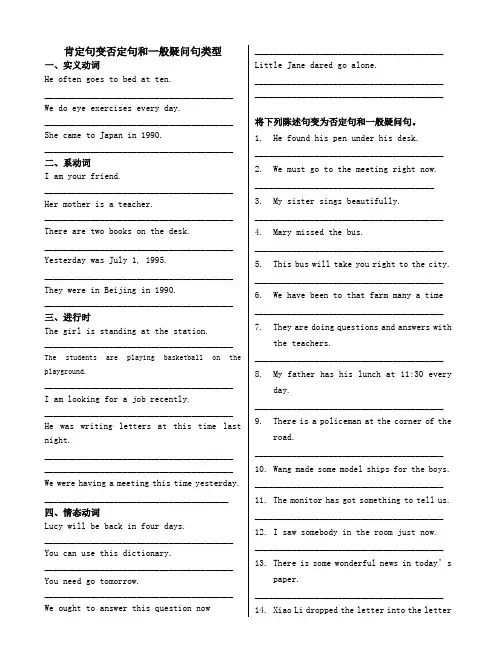
肯定句变否定句和一般疑问句类型一、实义动词He often goes to bed at ten._________________________________________ We do eye exercises every day._________________________________________ She came to Japan in 1990._________________________________________二、系动词I am your friend._________________________________________ Her mother is a teacher._________________________________________ There are two books on the desk._________________________________________ Yesterday was July 1, 1995._________________________________________ They were in Beijing in 1990._________________________________________三、进行时The girl is standing at the station._________________________________________ The students are playing basketball on the playground._________________________________________I am looking for a job recently._________________________________________ He was writing letters at this time last night.__________________________________________________________________________________ We were having a meeting this time yesterday. ________________________________________四、情态动词Lucy will be back in four days._________________________________________ You can use this dictionary._________________________________________ You need go tomorrow._________________________________________ We ought to answer this question now _________________________________________ Little Jane dared go alone.__________________________________________________________________________________将下列陈述句变为否定句和一般疑问句。
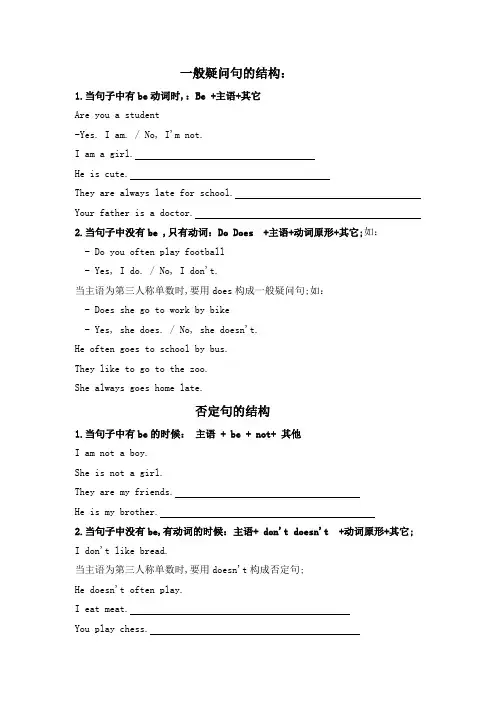
一般疑问句的结构:1.当句子中有be动词时,:Be +主语+其它Are you a student-Yes. I am. / No, I'm not.I am a girl.He is cute.They are always late for school. Your father is a doctor.2.当句子中没有be ,只有动词:Do Does +主语+动词原形+其它;如:- Do you often play football- Yes, I do. / No, I don't.当主语为第三人称单数时,要用does构成一般疑问句;如:- Does she go to work by bike- Yes, she does. / No, she doesn't.He often goes to school by bus.They like to go to the zoo.She always goes home late.否定句的结构1.当句子中有be的时候:主语 + be + not+ 其他I am not a boy.She is not a girl.They are my friends.He is my brother.2.当句子中没有be,有动词的时候:主语+ don't doesn't +动词原形+其它;I don't like bread.当主语为第三人称单数时,要用doesn't构成否定句;He doesn't often play.I eat meat.You play chess.She always does the housework on Sunday.The dog plays with its tail all the day.一、用所给动词的一般现在时填空;1. We often play in the playgrounnd.2 you brush your teeth every morning3. What do he usually do after school4. Danny study English, Chinese, Maths, Science, and Art an school.5. Mike sometimes go to the park with his sister.6. At eight at night, she watch TV with his family.7. Mike read English every day8. How many lessons your classmate have on Monday9. What time his mother do the housework二、按要求改写句子;1Do you often play football after school 改为肯定句2I have some books. 改为否定句3Gao Shan’s sister likes playing table tennis. 改为否定句4She lives in a small town near New York. 改为一般疑问句5I watch TV every day. 改为一般疑问句6We have four lessons. 改为否定句7Nancy doesn’t run fast. 改为肯定句三、单项选择;1. you have a bookA. DoB. AreC. IsD. Have2. They on a farm.A. workingB. is workC. workD. is worked3. Does Peter like to watch TV .A. Yes, he likeB. No, he doesn’tC. Yes, he’d likeD. No, he likes4. She doesn’t her homework in the afternoon.A. doingB. to doC. doesD. do5. Where’s my camera I it.A.am not findingB. am not seeingC. can’t findD. can’t lookat6. you usually late for school No, .A. Do, I amB. Does, notC. Are, I’m notD. Are, I aren’t7. she home at six every dayA. Is, leaveB. Does, leaveC. Is, leavesD. Does, left8. Mr. Yang English this term.A. teaches ourB. teaches usC. teachs usD. teach ourI have 3 new teachers. They are my English teacher, my teacher and my Chinese teacher. Miss zhao is pretty and active. She's a universitystudent. She's our English teacher. My teacher is Mr. Chen. He's tall and strong, and he's strict, too. Miss Sun is my Chinese teacher. She's quiet. She has long hair and big eyes.1. I have new teachers. A. twoB. threeC. four2. Miss Zhao is myteacher. A. EnglishB. ChineseC. PE3. Mr. Chen is . A. tall B. strong C. tall and strong4. Is my teacher strictA. Yes, she is B. Yes, he is C. No, he isn't5. Miss Sun is . A. quiet B. active C. strict。
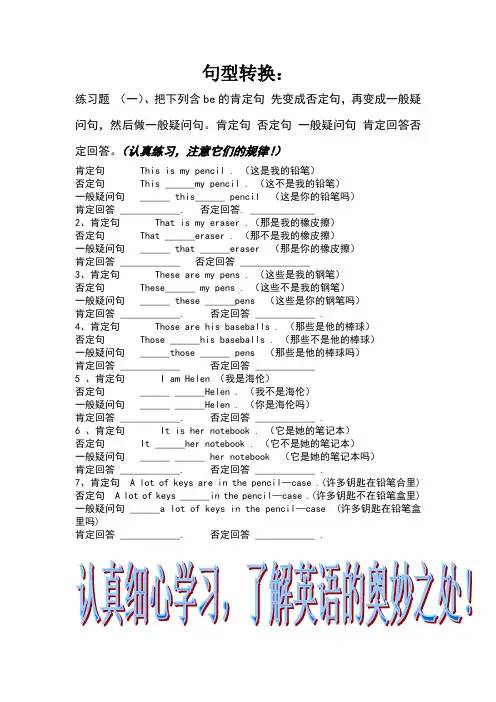
句型转换:练习题(一)、把下列含be的肯定句先变成否定句,再变成一般疑问句,然后做一般疑问句。
肯定句否定句一般疑问句肯定回答否定回答。
(认真练习,注意它们的规律!)肯定句 This is my pencil . (这是我的铅笔)否定句 This ______my pencil . (这不是我的铅笔)一般疑问句 ______ this______ pencil (这是你的铅笔吗)肯定回答 ____________. 否定回答. _____________2、肯定句 That is my eraser .(那是我的橡皮擦)否定句 That ______eraser . (那不是我的橡皮擦)一般疑问句 ______ that ______eraser (那是你的橡皮擦)肯定回答 ____________ 否定回答 ______________3、肯定句 These are my pens . (这些是我的钢笔)否定句 These______ my pens . (这些不是我的钢笔)一般疑问句 ______ these ______pens (这些是你的钢笔吗)肯定回答 ____________. 否定回答 ____________ .4、肯定句 Those are his baseballs . (那些是他的棒球)否定句 Those ______his baseballs . (那些不是他的棒球)一般疑问句 ______those ______ pens (那些是他的棒球吗)肯定回答 ____________ 否定回答 ____________5 、肯定句 I am Helen (我是海伦)否定句 ______ ______Helen . (我不是海伦)一般疑问句 ______ ______Helen . (你是海伦吗)肯定回答 ____________. 否定回答 ____________ .6 、肯定句 It is her notebook . (它是她的笔记本)否定句 It ______her notebook . (它不是她的笔记本)一般疑问句 ______ ______ her notebook (它是她的笔记本吗)肯定回答 ____________. 否定回答 ____________ .7、肯定句 A lot of keys are in the pencil—case .(许多钥匙在铅笔合里)否定句 A lot of keys ______in the pencil—case .(许多钥匙不在铅笔盒里)一般疑问句 ______a lot of keys in the pencil—case (许多钥匙在铅笔盒里吗)肯定回答 ____________. 否定回答 ____________ .。
年PEP五年级专题训练句型转换(肯定句-否定句-一般疑问句-特殊疑问句)————————————————————————————————作者:————————————————————————————————日期:2013年PEP五年级下专题训练—句型转换一、肯定句、否定句、一般疑问句和特殊疑问句定义1.肯定句:表示肯定的意思, 即不含有否定词“不”。
比如:我是一个学生 I am a student.他去上学 He goes to school.2.否定句:表示否定的意思。
比如:我不是一个男孩。
I am not a boy他不去上学 He does not go to school.3. 一般疑问句:回答为“是yes”或者“否no”的问句。
比如:你是一个学生吗? Are you a student?你喜欢英语吗? Do you like English?4. 特殊疑问句:回答不是“是yes”或者“否no”的问句,根据提问内容具体回答。
比如:现在几点了? What’s the time?哪一支笔是你的? Which is your pen?二、句型变化规则:A.肯定句变否定句1、在be动词后加not。
如:is not , are not , am not, was not, were not;eg: I am a teacher. → I am not a teacher.2、在can,等后加not。
如:cannoteg:Li Lei can swim. → Li Lei can not ( can't ) swim.1. I am listening to music.2. Mike is a student.3. Sarah can clean the classroom.4. They are in the zoo.5. There are some flowers in the vase.6.This is my sister.7.We are sweeping the floor.3、上述都没有的,在动词前加助动词否定形式do not, does not. (don’t/doesn’t)eg:Mr Wang works in a factory. → Mr Wang doesn't work in a factory.1. We need some masks.2. They like making the puppet.3. Su Hai and Su Yang live in a new house.4.I put a book on my head.5. They sing “In the classroom”together.6.We play basketball on Sundays.7. Tom likes listening to musicB.肯定句变一般疑问句如何将一个肯定的陈述句改为一般疑问句:1、把be动词放在句首,剩下的照抄,(some 改成any,my改成your等)句点改成问号。
肯定句改否定句和一般疑问句一、实义动词He often goes to bed at ten.We do eye exercises every day。
She came to Japan in 1990。
二、系动词I am your friend。
Her mother is a teacher。
There are two books on the desk。
Yesterday was July 1, 1995.They were in Beijing in 1990。
三、进行时The girl is standing at the station.The students are playing basketball on the playground..I am looking for a dog。
四、情态动词Lucy will be back in four days。
You can use this dictionary. You need go tomorrow。
You should study hard..将下列陈述句变为否定句和一般疑问句.1.He found his pen under his desk。
2.We must go to the meeting right now.3.I wrote him a letter last week。
4.My sister sings beautifully。
5.Mary missed the bus.6.This bus will take you right to the city.7.They are doing questions and answers with theteachers。
8.My father has his lunch at 11:30 everyday。
9.There is a policeman at the corner of the road。
一般疑问句以及肯定句否定句练习题
一、一般疑问句:特点:是以问号“?”结尾的
步骤:1、找出be动词(am, is , are)
2、be动词提前,放在句子开头,注意要改写成大写
3、其余部分照抄,但遇到my要改成your, I 要改成 you
(注意:you 只能跟are连)
一般疑问句的回答:分为两种,肯定回答和否定回答
肯定回答:Yes, it/she/he is. 或者Yes, I am.(视具体情况而定)
否定回答:No, it/she/he is not. 或者No, I am not.(视具体情况而定)
练习题:将下列句子改成一般疑问句并进行回答。
1、This is a pen.(否定回答)
2、This is my ruler.(否定回答)
3、She is Yang Ling.(否定回答)
4、It is an apple.(肯定回答)
5、I am Mike.(肯定回答)
二、否定句,是以句号“。
”结尾的
步骤 1、找出句子中的be(am ,is ,are)动词
2、在be动词后+“not”,其余照抄
否定句改为肯定句,只要将be动词后的”not”去掉练习题:将下列句子改成否定句或肯定句
1、T his is my pen.
2、T hat is your pencil.
3、I t is a ruler.
4、T his is not a pen.
5、S he is Yang Ling.。